Juniper berries are a type of berry that grows on the juniper tree.
They are what give gin and vermouth their distinctive flavor.
They also have some culinary uses, such as in a savory sauce for roast duck or venison.
These berries can be eaten fresh off the branch when they’re ripe, but it’s better to dry them first because they’re very bitter until dried.
In this article, we will cover what juniper berry is, what juniper berry taste like, and the benefits of these berries.
What is Juniper Berry?

Juniper berries come from a small evergreen shrub, Juniperus communis.
They are grown throughout the world in many climates and can be found growing naturally as well.
The most popular use of junipers is in the production of gin.
Juniper berry plants are a popular landscaping plant and can be found growing as hedges or used to decorate garden beds, walls & paths with their beautiful blue-green foliage.
The berries themselves make for wonderful additions to wreaths, garlands & other holiday decorations.
And they smell great.
The intriguing blue-green berries of the juniper tree are used in various pies, jellies, sauces, and other dishes.
Its bitter flavor is often accompanied by sweet flavors like sugar or honey to counterbalance it.
Junipers can either be eaten whole and raw or dried out and made into tea.
They also taste great when cooked with meats such as ham.
Nutritional Benefits of Juniper Berries
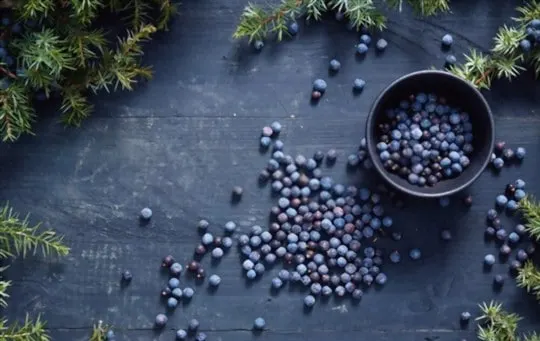
Juniper berries are often used for their health benefits in cooking.
One of the most popular is how they can help with stomach problems like indigestion, nausea, and constipation.
Junipers also prevent coughing and help clear mucus from the lungs by loosening chest muscles; they’re often used as a tea for this purpose today.
Junipers can also be used topically for skin conditions like psoriasis and eczema; they stimulate blood circulation while loosening the area to relieve pain, redness, and other symptoms.
They are a great source of vitamin C, which is needed for many bodily functions.
They also contain high levels of Vitamin A and B and minerals like potassium, calcium, magnesium, zinc, and iron – all very important to your health.
The anti-inflammatory properties of juniper berries make them an excellent treatment for arthritis pain.
And their high levels of antioxidants help fight against cancer cells, making them a great addition to your diet.
What Does Juniper Berry Taste Like? Does Juniper Berry Taste Good?
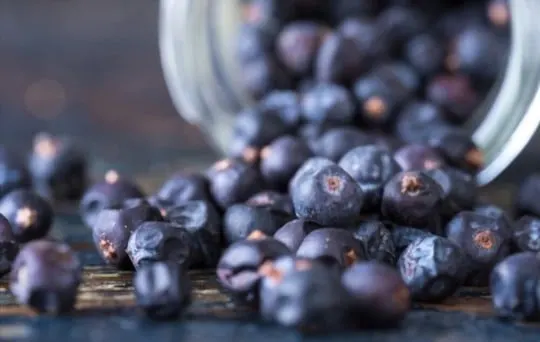
Juniper berries have a wonderful, woodsy aroma that is perfect for the winter.
Juniper berries are most often used to flavor gin but can also be added to other liquors.
Juniper berries are not sweet and have a piney taste with a hint of sweetness.
The bitterness makes juniper uniquely complementary to sweet ingredients like apple cider, caramelized bananas with brown sugar, or chocolate cake batter.
These berries come in different sizes; some are large and round, while others are small and kidney-shaped.
The larger ones tend to be more flavorful than the small ones.
The texture of a juniper berry is crisp and dry.
When it’s cooked, dried, or crushed, the flavor can be strong and intense with an herbal aroma.
They are often preserved in alcohol, either as a small jar of pickled juniper berries or infused into vodka and gin.
The flavor is stronger when the fruit is dried rather than left fresh.
If you’re looking for an herbal tea with a little more depth to it, try steeping some leaves from this plant.
How to Use Juniper Berry?

Juniper berries can be used in a variety of ways.
You can drink it as tea, use them to make gin or vodka, add the berry to various dishes for flavoring and even brew your juniper wine.
- Add the berries to a pot of water and bring it to a boil. Turn down the heat, add any sweetener you may want, and let this simmer for about 20 minutes. It should be good enough at this point that you can drink it as a tea or use it in cooking recipes where other juniper berry teas may be called for.
- You can also use the berries to make your gin or vodka by adding them to a jar, filling it with alcohol, and allowing it to sit in a cool dark place for at least two weeks. It would be best to filter out the juniper berries before bottling up this homemade liquor as you would any other spirit.
- Juniper berries can be used in a wide variety of dishes for flavoring. They are often added to meaty stews, but you may also want to use them when making game meats as they will give the final dish a nice rich flavor.
How to Choose Juniper Berry?
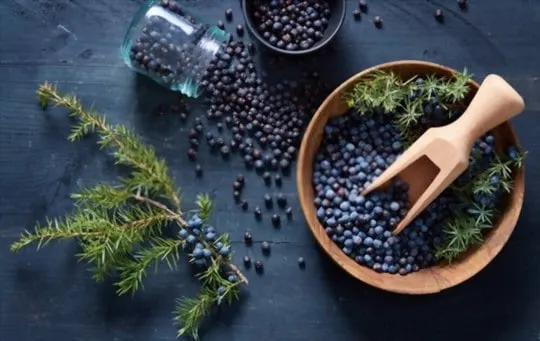
While many types of this fruit are found in different parts of the world, they all share certain characteristics that differentiate them from other fruits and plants.
When choosing a good-quality juniper for cooking or drying purposes, it’s important to know what qualities you’re looking for so as not to get stuck with unusable ones.
Here are some tips on how best to choose your perfect pick:
- They should be dry and pliable with no signs of mildew or rot.
- Ripe junipers will feel light for their size, firm to the touch, and may yield slightly when squeezed gently between your thumb and forefinger.
- Ripe junipers will be a uniform color with few if any, brown spots.
- They should have an earthy smell that’s neither sweet nor sour, and they shouldn’t give off any unpleasant aromas like ammonia or bleach-like odors.
How to Store Juniper Berry?
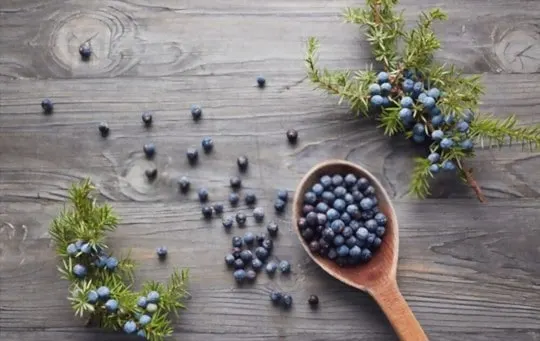
Juniper berries are highly aromatic and flavorful berry.
They can be used in both savory or sweet dishes, making them versatile for any occasion.
To preserve their flavor during storage, it is recommended that you store them in an airtight container and place them in the fridge.
You can store juniper berries in the freezer to make them last longer.
Freezing your fresh, newly sourced juniper berries will extend their shelf life and provide you with a better product when it’s time for us.
Conclusion
In conclusion, juniper berry has a unique taste that’s very different from other berries.
They can be used in many different recipes because of its versatility, and it’s not too hard to find.
If you’re looking for a new berry to try, juniper berries could be the perfect one.
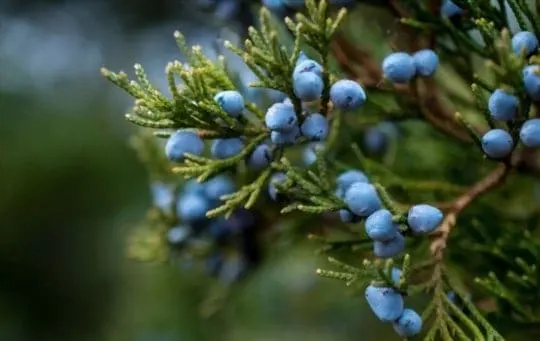
What Does Juniper Berry Taste Like? Does Juniper Berry Taste Good?
Ingredients
- Juniper berry
- Ingredients from your favorite recipes
Instructions
- Depending on the recipes you choose, the taste can vastly differ.
- For authentic results, it is important to choose a recipe that will highlight the original flavor.
- Have fun experimenting with different recipes and taste tests!
